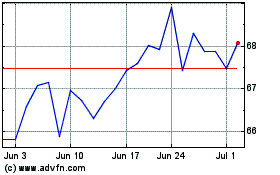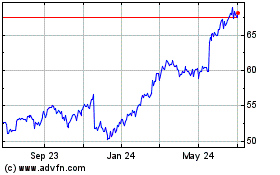By Heidi Vogt
This article is being republished as part of our daily
reproduction of WSJ.com articles that also appeared in the U.S.
print edition of The Wall Street Journal (April 11, 2018).
WASHINGTON -- At a time when many government agencies are
relying on acting directors or making do with unfilled positions,
the U.S. Postal Service may have it the worst. Its governing board
has been empty since December 2016.
That means no one fills nine seats on a body akin to a corporate
board of directors for an agency that is the largest civilian
employer in the country after Walmart Inc.
At a February board meeting, only two people -- Postmaster
General Megan Brennan and her deputy -- sat at the long table in
the Ben Franklin conference room on the top floor of the Postal
Service headquarters. They were flanked by empty chairs. The board
is operating without governors for the first time since it was
created in 1970.
The Postal Service is in the spotlight after President Donald
Trump tweeted accusations that Amazon Inc. -- a key postal system
customer -- exploits the service for its own gains, accusations
that immediately met with controversy. A bigger issue, according to
the Postal Service, is unfunded liabilities for employee benefits,
which requires congressional legislation to fix. Bills addressing
these issues have been introduced in the House and Senate.
These issues highlight the leadership shortage, since it usually
falls to the board members to advise on everything from crisis
management to congressional engagement. The board is also
responsible for many other tasks, from rate increases to the hiring
or firing of the postmaster general, and it sets policies that
directly affect operations at big customers, such as mail-order
catalog businesses.
"It's a huge problem," said Hamilton Davison, the head of the
American Catalog Mailers Association, an industry group. He said
many catalog mailers are dealing with the expiration of discounts
that need the postal governors' approval to renew.
"For the larger mailers, this represents millions of dollars,"
Mr. Davison said.
The shortage of Postal Service leadership could well be as
consequential as the vacancies at other agencies, including the
State Department, the Environmental Protection Agency, the Energy
Department and others. After the president nominates someone for
the Postal Board, the nominee must go through a Senate hearing and
then be confirmed by a Senate vote.
It became clear the board would be at least temporarily without
governors when President Barack Obama's nominees didn't make it
through Congress before the end of his term. More than a year has
passed since then. And with so many other appointments in limbo and
Congress tussling over items like budget and immigration, the
Postal Service board doesn't appear to be at the top of anyone's
agenda.
"The president, I'm sure it's not his top priority, but it
doesn't seem to be Congress's top priority either," said Jim
Bilbray, who was the sole remaining governor until his term expired
in 2016.
Mr. Trump's tweets have been more focused on Amazon contracts,
which are negotiated with the agency's sales, finance and legal
departments then submitted for regulatory approval. The board of
governors isn't directly involved in negotiating these contracts,
but it is involved in setting long-term strategy and consulting
with members of Congress on legislation that might improve its cost
structure.
Meanwhile, businesses that rely on the service are growing
nervous, particularly as volume discounts and other arrangements
have expired.
Retailer Hammacher Schlemmer & Co., a seller of gifts,
gadgets and housewares that has mailed catalogs since 1881, used
such discounts to send out additional catalogs -- a move the Postal
Service has said boosts future revenue.
The lack of new promotions is going to cost the company hundreds
of thousands of dollars, said Steve Gustafson, marketing manager at
the retailer.
"It's a de facto price increase," Mr. Gustafson said.
The Postal Service has suffered from leadership shortages since
well before the Trump administration. Mr. Obama nominated five
people to the board, but they didn't get through the approval
process. Sen. Bernie Sanders (I., Vt.) blocked three of them -- a
move that, in practice, kept all of them from being approved. He
was concerned two of them wanted to gut the Postal Service, and
that another -- a former payday lending lobbyist -- would block an
effort to bring in additional revenue by offering basic banking
services.
Mr. Trump nominated three people in October, but the approval
process is in the early stages. In a rare situation these days, the
slate of nominees has bipartisan support. Most expect them to be
approved if they ever make it to a committee hearing, but no such
hearings have been scheduled.
Some people familiar with the confirmation process have said a
backlog in more high-profile positions at other agencies is likely
making it more difficult to get to lower-level appointments, while
others argue it is because of a general slowdown in activity at the
Homeland Security and Governmental Affairs Committee.
Jack Potter, who was postmaster general from 2001 to 2010, said
the status quo can't last much longer.
"It's very problematic at a period of time when the Postal
Service is seeking to right-size its finances, and pricing and
products are two of the key tools to do that," Mr. Potter said.
"There is this shroud of doubt over how to make that happen without
a board."
He said the board was a key sounding board when he was
postmaster general and essential to dealing with crises, such as
the 2001 anthrax attacks, when letters laced with anthrax spores
arrived at media and government offices. Five people died.
"They were invaluable to me at that time," Mr. Potter said,
explaining he held regular teleconferences with the board as the
attacks unfolded. They "were able to help connect me with different
groups in the government and advise who I should be working
with."
In February, Ms. Brennan said she was "optimistic" that Mr.
Trump's nominees will be confirmed in time for a board meeting
scheduled for April. That meeting is now tentatively scheduled for
early May.
Write to Heidi Vogt at heidi.vogt@wsj.com
Corrections & Amplifications Hamilton Davison is the head of
the American Catalog Mailers Association. An earlier version of
this article incorrectly called the industry group Catalog Mailers
Association.
(END) Dow Jones Newswires
April 11, 2018 02:47 ET (06:47 GMT)
Copyright (c) 2018 Dow Jones & Company, Inc.
Walmart (NYSE:WMT)
Historical Stock Chart
From Apr 2024 to May 2024

Walmart (NYSE:WMT)
Historical Stock Chart
From May 2023 to May 2024
